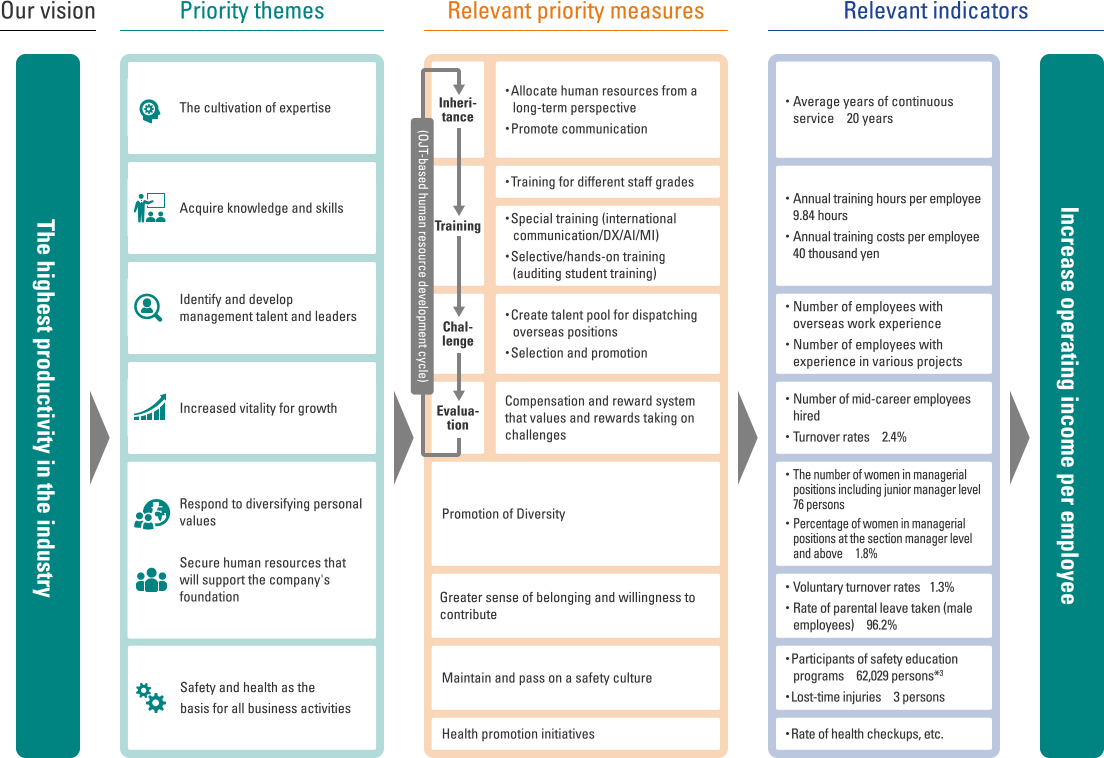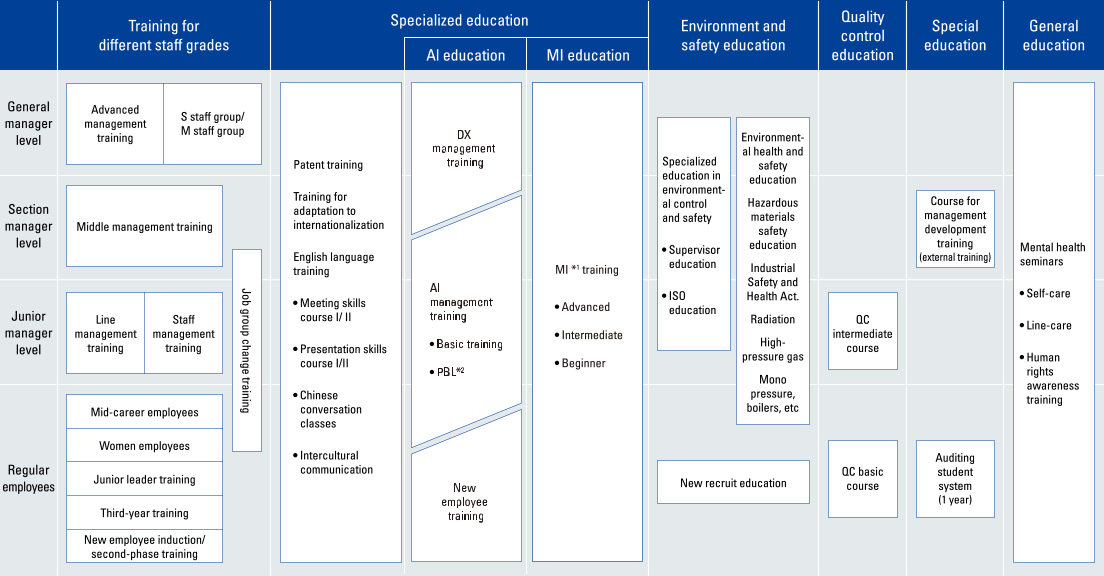Human Resources Strategy
- Home > Sustainability > Social >
Basic Policy on Human Resources Strategy
Human Capital Investment*1,2

*1Scope: The employees hired by Shin-Etsu Chemical and working in Shin-Etsu Group companies.
*2Figures listed under “Relevant indicators” are actual results for FY2024.
*3Shin-Etsu Chemical (Non-consolidated)
We aim to further improve labor productivity. To this end, we have set operating income per employee as a key indicator and are focusing on developing “T-shaped human resources” who can achieve high productivity. A “T-shaped human resource” is someone who is an expert in a certain task or field, but also has a wide range of work skills that allow them to excel in other fields. The average growth rate of operating income in recent years has exceeded the average growth rate of the number of employees, therefore the productivity per employee has also increased.
On-the-job training (OJT) is the cornerstone of our efforts to develop T-shaped human resources. We place employees into jobs with a sense of respect for their aptitude and professional aspirations, and we support each employee to become a true expert in their assigned job. For this reason, the Company does not implement one-size-fits-all personnel transfers or so-called routine reassignments. By having employees thoroughly study the work they are responsible for, we focus on developing employees with high levels of work ability.
Our Group companies overseas also follow the same approach to human resource development described here, and strive to respect the diversity of each country’s laws, regulations, customs, human resources and culture. In addition to sending young employees to overseas operation bases, employees working in Japan also acquire an international mindset through working with overseas business partners.
Education/Training and Personal Development
In addition to on-the-job training, the Shin-Etsu Group offers a variety of training programs to employees for different stages of their growth. The Group supports employees’ growth through various training systems, which include training for different staff classification, global communication training, an auditing student system, environmental education, safety education, mental health education, and AI training.
Training for Different Staff Grades
We provide various level-specific training programs to learn management, leadership, communication, and problem-solving skills that are essential for improving performance and are required at each level of the organization.
- General manager training (Advanced management training, S staff group/M staff group training)
- Section manager training (Middle management training)
- Junior manager training (Line management training/Staff management training)
- Regular employees (Mid-career employees training, Women employee training, Junior leader training, Third-year training)
Global Communication Training
The Group’s business partners are spread around the world, with overseas sales now accounting for approximately 80% of consolidated sales. Competency in a foreign language is therefore an essential skill for smooth operations. Therefore, the company offers the following kinds of training:
- English language training (meeting skills course and presentation skills course)
- Cross-cultural communication training
- Chinese conversation classes
AI Training
To discover and develop human resources capable of utilizing AI and to improve the overall level of AI in the Company, we offer, at our own expense, the AI training listed below. In FY2024, 194 employees participated, and in the four years since FY2021, a total of 994 employees have participated.
- New employee training: e-learning for new and young employees
- DX management training: E-learning for general managers and section managers involved in projects
MI Education
We offer the training described below with the goals of developing personnel capable of utilizing machine learning for material exploration and shortening R&D time. In FY2024, 49 employees participated, and in the four years since FY2021, a total of 185 employees have participated.
- MI (materials informatics) practical training: Practical training mainly for researchers at research centers. Conducted based on our own proprietary materials. Three courses are available (beginner, intermediate, and advanced) depending on the student’s level of proficiency.
University Auditing Student System for Employees
In 1962, Shin-Etsu Chemical established a system for sending employees to universities as auditing students with the goal of improving on-site capabilities at each workplace. Under the system, up to about ten operators each year are chosen from the Group’s plant manufacturing sites and sent to study at universities for one year. The program is similar to a study abroad program, except that the students stay in Japan. During the training period, students not only learn specialized knowledge by auditing university classes, but also network with people from other businesses, plants, and corporate divisions that they otherwise may not have much contact within their daily work, which is also important. In the 63 years since the system was introduced, a total of 557 employees have completed the program, and many of the graduates go on to play key roles in their workplaces.
Training System List

*1Material Informatics
*2Problem-based Learning
Performance-based Personnel Evaluation Systems
The Group has introduced an employee evaluation system that emphasizes their ability and work performance. This system aims to increase employees’ motivation by reflecting their performance and attitude in the benefits that they will receive, and evaluates how they meet their challenges to achieve higher goals. Employees’ set ambitious work goals and improvement targets at the beginning of each fiscal year, and are then encouraged to grow by challenging themselves to achieve these goals. Supervisors provide advice and guidance to help employees achieve their goals. At the end of the fiscal year, employees are evaluated on the degree to which they have achieved their goals. At the same time, employees' abilities, potential for growth, and attitude toward their work are taken into consideration to motivate employees and encourage them to grow. To manage the personnel system in a fair and appropriate manner, evaluation training is provided for all managers who conduct performance review, so that they can carry out personnel evaluations fairly. Transparency is increased by informing evaluation standards to employees. In addition, there is a system of interviews between an evaluator and a direct report to ensure that they can communicate successfully. During interviews, each staff member and their immediate supervisor use Communication Sheets to ensure mutual awareness of expectations and set half-year goals. Furthermore, feedback on progress is given for further development of skills.
Related Information
*Personnel subject to human resource development in the Group are the employees hired by Shin-Etsu Chemical and working in Shin-Etsu Group companies.
